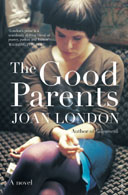 | Reviews of The Good Parents Joan London Random House 2008 |
[This novel has been shortlisted for the Best Book award in the South East Asia and the Pacific region of the 2009 Commonwealth Writers' Prize.]
From the publisher's page:
Maya de Jong, an eighteen-year-old country girl from the West, comes to live in Melbourne and starts an affair with her boss, the enigmatic Maynard Flynn, whose wife is dying of cancer. When Maya's parents, Toni and Jacob, arrive to stay with her, they are told by her housemate that Maya has gone away and no one knows where she is.ReviewsAs Toni and Jacob wait and search for Maya in Melbourne, everything in their lives is brought into question. They recall the yearning and dreams, the betrayals and choices of their pasts - choices with unexpected and irrevocable consequences.
With Maya's disappearance, the lives of all those close to her come into focus, to reveal the complexity of the ties that bind us to one another, to parents, children, siblings, friends and lovers.
Pacy and enthralling, The Good Parents is at once a vision of contemporary Australia and a story as old as fairytales: that of a runaway girl.
Cath Kenneally doesn't pull any punches in her review of the novel in "The Australian".
London's first novel, Gilgamesh, was published in 2001, short-listed for the Miles Franklin and won the 2002 The Age Book of the Year fiction prize. The Good Parents is better; it ought to win every prize going.In "The Age", Michael McGirr sees a natural progression from the author's earlier work: "Joan London writes wonderfully about intimacy between strangers...Her new novel, The Good Parents, is full of characters who vanish but not without trace. In this regard, it shares something with her previous book, Gilgamesh, a story in which small town Western Australia is the hub of a world where characters struggle to find their place of belonging...The Good Parents is no less skilful in handling the many shades of loss, the eerie and sometimes petulant presence of the absent. Once again, small town Western Australia is the hub of a moving world...The Good Parents is underwritten by a wealth of human understanding. It knows stuff. It has compassion for people who make choices they don't have to; for families that never set."In many novels, one character stands out as being so well-realised you suspect that character is the author. With The Good Parents, you feel that about them all, male or female, young, middle-aged or elderly.
Roxana Robinson in "The New York Times": "London, who's Australian, recalls celebrated British stylists -- Elizabeth Bowen, William Trevor -- and another Aussie native, Shirley Hazzard. Like theirs, London's language is so lovely, her tone so gentle, that the sadness of her truths is somehow shocking...London's dark and lovely work is both a novel of ideas and one of emotions. Here are dangerous currents that pulse beyond control, as well as the great intellectual movements that shape our lives."
David Pullar on "PopMatters": "London's style is mostly the issue. She is heavy on description -- even to the point of overload in the early chapters -- yet sparing with metaphor or poetry. As a result what might otherwise have been a languid, dreamy narrative, reminiscent of the pace of rural life, ends up as merely dull. There is simply not enough flair in the writing to make up for the sluggishness of the plot...Unfortunately, the undistinguished prose detracts from the interesting themes London touches on: the generation gap and the challenge of parenthood. The Boomer narrative has been told over and over, but The Good Parents sets out to explore its echoes in the next generation. Every generation has its distinctives and its repetitions of previous groups. By contrasting Maya's story with those of her parents, London draws out these similarities and differences."
Claire Cameron in "The Globe and Mail": "Though it sounds like the plot of a dark mystery or a cryptic crime novel, The Good Parents is a slower book about the restlessness of waiting. Answers start to unravel quietly and elegantly through the characters thoughts and memories...Author Joan London shows how moving to a new place turns a person into a stranger and an outsider. This strangeness can change many things, including the relationship with those you have left behind...London's prose is straightforward and purposeful, which allows space for her sharp observations. She is especially good on how the generations affect each other...Family history, in London's world, does not repeat itself. Instead, it creates a pattern. What you have been taught in childhood always comes back."
Interview
Romona Kaval on ABC Radio National's "Book Show".
